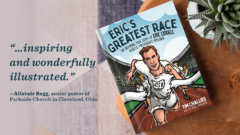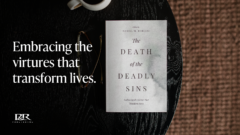Have you ever considered what it must have been like for Adam and Eve to walk and talk with God in the Garden of Eden? Have you thought of the things you would say to God if you were to hear His footsteps today? What Christian hasn’t experienced a pang of jealousy when he reads “they heard the sound of the Lord God walking in the garden in the cool of the day.” And what Christian hasn’t experienced a pang of remorse when he reads how Adam and Eve squandered that unique privilege. There was God, walking in the garden as He had done before. Adam and Eve recognized the sound of his footsteps. But this time, instead of rushing to Him and rejoicing in His presence, they fled and they hid from Him. They had sinned and they knew that there were consequences for such tyranny. They feared their Maker.
Ever since this fall into sin, the history of God’s people has been a history of mediation. Mediation is a concept we encounter quite often today. We hear of sports contracts being settled by mediation; we hear of lawyers becoming involved in mediation between divorcing couples; we hear of strikes being settled by a mediator who stands between the workers and the corporation and handles communications between them. These hint at mediation as we understand it from the Bible. In rejecting God’s goodness and benevolence and in putting himself in place of God, Adam erected a barrier between himself and God. The close communion that had once existed was ruptured and destroyed. No longer would God come walking to them in the cool of the day; no longer would He allow them to stay in His Garden. He forced them out and barred the way so they could not return. The very next passage of Scripture relates the first murder. Human history had taken a drastic, horrifying turn for the worse. The lines of communication were shattered.
From that time, God no longer allowed people to commune with Him in the same way. From that point on, man could no longer approach God as they had in the Garden. They had to approach God through a mediator. When we think of mediators we may think first of Moses, a man to whom God revealed Himself and a man whose task it was to then make the will of God known to the Israelites. After Moses was Joshua, and after Joshua were judges and prophets. There were priests to stand between God and man, offering to God sacrifices on behalf of the people and bestowing God’s blessings and curses on His behalf. Always there were mediators, always there were people standing between God and man. Always people must have realized their inability to approach God as they were. Always they must have wondered, “how can we approach God directly?”
There are some words whose meaning we understand without difficulty and some that seem to require a little more work. When we think of the word immature we understand that the prefix -im is equivalent to -un or not. A person who is immature is a person who is not mature—he displays a lack of maturity. But a similar word, immediate does not often strike us in the same way. If we break off the prefix it begins to make sense. Im-mediate harkens back to an older and perhaps less common understanding of that word. The American Heritage Dictionary defines immediate as “acting or occurring without the interposition of another agency or object; direct.” Immediate indicates access that does not require mediation. It is immediate access to God that we so wish to have, but that we cannot have.
Since man’s fall into sin, we have longed to be able to approach God directly. And well we should, for God made us to enjoy this unbroken communion with Him. We were made in the image of God and were made to know God. We long to enjoy an unmediated relationship. But even today, even in this New Testament era, we still rely on mediated revelation. God has been gracious in giving us His Word and His Spirit to communicate truth to us. But even this is mediated truth, truth mediated through the Spirit.
God sent a better mediator in Jesus Christ—a mediator that was better than Moses and better than the priesthood, judges and prophets. 1 Timothy 2:5 says, “For there is one God, and there is one mediator between God and men, the man Christ Jesus.” Hebrews tells us that Jesus is the mediator of a new and better covenant.
Jonathan Edwards says this about this great mediator:
The redeemed are dependent on God for all. All that we have—wisdom, the pardon of sin, deliverance, acceptance in God’s favor, grace, holiness, true comfort and happiness, eternal life and glory—we have from God by a Mediator; and this Mediator is God. God not only gives us the Mediator, and accepts His mediation, and of His power and grace bestows the things purchased by the Mediator, but He is the Mediator. Our blessings are what we have by purchase; and the purchase is made of God; the blessings are purchased of Him; and not only so, but God is the purchaser. Yes, God is both the purchaser and the price; for Christ, who is God, purchased these blessings by offering Himself as the price of our salvation.
We rejoice that God has accepted the mediation of His Son. We rejoice that we can approach the throne of God. But still we realize that there is a mediator. To speak to the Father, we speak through the Son. To hear from the Father, we rely on the Spirit. Still we need someone to stand between. Still we long for the im-mediate. We long to see God as He is. We long to approach Him directly. We long to have the relationship fully and finally restored. We look in that dim mirror, always wishing we might see face-to-face.









